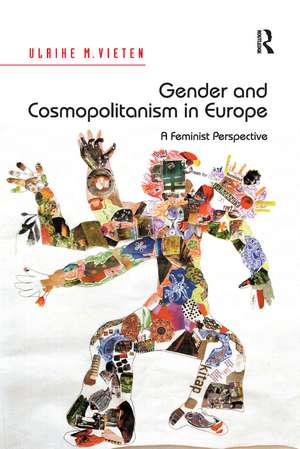Gender and Cosmopolitanism in Europe: A Feminist Perspective
Autor Ulrike M. Vietenen Limba Engleză Paperback – 11 oct 2016
| Toate formatele și edițiile | Preț | Express |
|---|---|---|
| Paperback (1) | 462.25 lei 6-8 săpt. | |
| Taylor & Francis – 11 oct 2016 | 462.25 lei 6-8 săpt. | |
| Hardback (1) | 1057.89 lei 6-8 săpt. | |
| Taylor & Francis – 28 apr 2012 | 1057.89 lei 6-8 săpt. |
Preț: 462.25 lei
Nou
Puncte Express: 693
Preț estimativ în valută:
88.46€ • 92.02$ • 73.03£
88.46€ • 92.02$ • 73.03£
Carte tipărită la comandă
Livrare economică 14-28 aprilie
Preluare comenzi: 021 569.72.76
Specificații
ISBN-13: 9781138250734
ISBN-10: 1138250732
Pagini: 196
Dimensiuni: 156 x 234 mm
Greutate: 0.29 kg
Ediția:1
Editura: Taylor & Francis
Colecția Routledge
Locul publicării:Oxford, United Kingdom
ISBN-10: 1138250732
Pagini: 196
Dimensiuni: 156 x 234 mm
Greutate: 0.29 kg
Ediția:1
Editura: Taylor & Francis
Colecția Routledge
Locul publicării:Oxford, United Kingdom
Notă biografică
Ulrike M. Vieten is Research Fellow at the Institute for the Study of Conflict Transformation and Social Justice at Queen's University Belfast, UK.
Recenzii
'In this rich, insightful and thought provoking monograph, Ulrike Vieten discusses and analyzes contemporary political reality as well as political thought around notions of diversity and alterity of belonging from a feminist and intersectional lens. Focusing on contemporary political reality as well as political thought on cosmopolitanism, the author highlights the situated, embedded and exclusionary boundaries that different discourses on cosmopolitanism assume and calls for an alternative transversal feminist discourse of subaltern cosmopolitanism.' Nira Yuval-Davis, University of East London, UK 'This books offers a fresh feminist critique of the burgeoning, and largely male-oriented, literature on cosmopolitanism in 21st century Europe. Its comparison of two very different national discourses, that of Britain and Germany, through the writings of mainstream and minority intellectuals, enables the author to explore alternative gendered ways of belonging in a transnational public sphere.' Eleonore Kofman, Middlesex University, UK 'As Prof. Vietens writes, "the idea of global humanity is much too exciting to leave it to the 'boys'" She offers readers a sweeping corrective, using a feminist lens to bring to light what so many theorists have left out and to provide readers with a way forward to a more just and equitable society.' Peggy Levitt, Wellesley College, USA, author of God Needs No Passport 'Ulrike M Vieten explores the highly contested concept of cosmopolitanism in this recent book. Through an in-depth engagement with the work of key cosmopolitanism thinkers including Jürgen Habermas and Homi Bhabha, and considering feminist criticisms from Chantal Mouffe, Vieten provides an engaging but challenging read.' LSE Review of Books '[Ulrike Vieten] weaves together an eclectic mixture of theories, theorists and historical background in the development of her argument and the monograph offers a timely interjection, from a feminist perspective, into debate
Cuprins
Introduction Gendered Cosmopolitanism: The Scope of this Book, Ulrike M. Vieten; Chapter 1 Who Belongs? Who is the Other?, Ulrike M. Vieten; Chapter 2 Recognition, Social Equality and the Current EU Anti-discrimination Policy, Ulrike M. Vieten; Chapter 3 Kulturnation and the Homogenised Notion of Community Belonging: Jürgen Habermas's and Ulrich Beck's Approaches to ‘European’ Cosmopolitanism, Ulrike M. Vieten; Chapter 4 Global Trade, the City and Commercial Cosmopolitanism: David Held's and Homi K. Bhabha's Approaches to New Cosmopolitanism, Ulrike M. Vieten; Chapter 5 About Dead-Ends, One-Way Streets and Critical Crossroads, Ulrike M. Vieten; Chapter 6 Transversal Conversations on the Scope of New Cosmopolitanism: Beyond the Eurocentric Framework, Ulrike M. Vieten;
Descriere
Gender and Cosmopolitanism in Europe combines a feminist critique of contemporary and prominent approaches to cosmopolitanism with an in-depth analysis of historical cosmopolitanism and the manner in which gendered symbolic boundaries of national political communities in two European countries are drawn. Exploring the work of prominent scholars of new cosmopolitanism in Britain and Germany, including Held, Habermas, Beck and Bhabha, Gender and Cosmopolitanism in Europe delivers a timely intervention into current debates on globalization, Europeanization and social processes of transformation in and beyond specific national societies.
